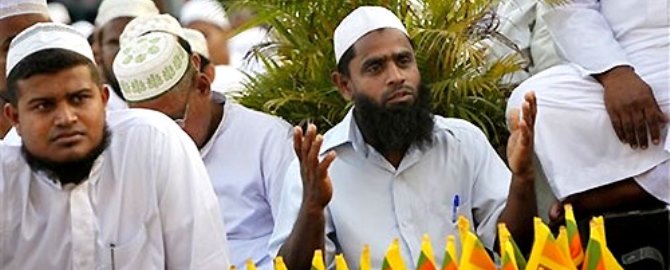ECONOMYNEXT – Former president Mahinda Rajapaksa who is opposition United People’s Freedom Alliance in Kurunegala has dropped minority Tamils and Muslims from his list of candidates to head a Sinhala-only team.
The former leader was not present at the Kurunegala district secretariat to submit nomination forms leaving the menial task to his deputy and former energy minister Anura Priyadharshana Yapa.
Kurunegala, the third largest electoral district with a vote base of 1.26 million has a seven percent Muslim population.
Political analysts see the total absence of minority candidates in the UPFA list as a sign that Rajapaksa will capitalise on his war credentials to corner votes in a district that would otherwise have no strong links to his family.
In the district of Galle too, the UPFA did not field a single minority candidate even though the town of Galle has a considerable Muslim population.
However, the UPFA national list had A. H. M. Fowzie topping the list with no guarantee that he will be given a seat after the August 17 election.
Almost all the key figures who came out to support Maithripala Sirisena for his presidential election bid in January have joined a broad coalition with the ruling United National Party (UNP).
While the joining of the JHU, or the party of Buddhist monks, would boost the UNP’s electoral hopes, the lestist anti-Rajapaksa JVP and Fielf Marshall sarath Fonseka’s party contesting separately could hurt both the two main parties.
Over 6,000 candidates are in the running for the 225-member parliament where a minimum of 113 seats must be won to form a majority government.
Analysts do not expect the UNP to secure 113 seats, unless there is a major upset. However, the party with the largest number of seats can make a claim to form the next government.
The UPFA enters the fray as underdogs, but the shortest campaign period in Sri Lanka’s parliamentary election history could still produce surprises.
Political parties will have just over a month to campaign. According to Sri Lanka’s bizarre parliamentary elections act of 1981, it is an offence for a candidate to go from house to house canvassing votes for himself. Candidates are also not allowed to put up posters, banners or flags at public places, a regulation that is often observed in the breach.
Under the 19th amendment to the constitution, the president will not have powers to sack the assembly and call snap elections until the assembly completes four and a half years out of its five year term.
The UNP launches its election campaign from Kandy on Tuesday while the UPFA is starting off on Friday from Anuradhapura, the same place from where Rajapaksa launched his unsuccessful bid for the January 2015 presidential election. (Colombo/July13/2015)
By Our Political Correspondent ENS
